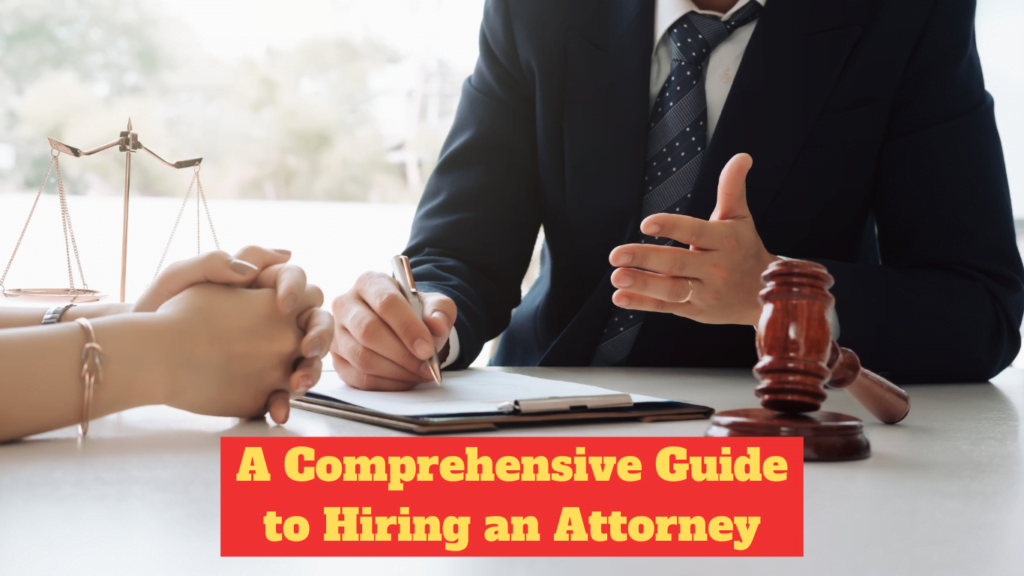Introduction
Attorney: When legal issues arise, seeking the assistance of an attorney becomes essential. Attorneys are legal professionals who provide expertise, guidance, and representation in various legal matters. In this article, we will explore the process of hiring an attorney, from understanding the importance of legal counsel to finding the right attorney for your specific needs.
Table of Contents
1. The Role of an Attorney
Attorneys, also known as lawyers, play a crucial role in providing legal representation and advice to individuals, businesses, and organizations. They are licensed professionals who have undergone extensive legal education and training. Attorneys assist clients in understanding the complexities of the legal system, protect their rights, and advocate on their behalf in various legal matters.
2. Assessing Your Legal Needs
Before hiring an attorney, it is important to assess your specific legal needs. Determine the nature of your legal issue, whether it involves personal injury, family law, criminal defense, business law, or any other area. Understanding your legal needs will help you find an attorney with the relevant expertise and experience to handle your case effectively.
3. Researching Potential Attorneys
To find potential attorneys, start by seeking recommendations from trusted sources such as friends, family, or colleagues who have had positive experiences with attorneys. Additionally, you can utilize online directories, bar association websites, and legal referral services to compile a list of potential candidates.
4. Evaluating the Attorney’s Expertise
Once you have a list of potential attorneys, evaluate their areas of expertise. Attorneys often specialize in specific practice areas such as immigration, real estate, intellectual property, or estate planning. Consider whether their expertise aligns with your legal needs to ensure they have the knowledge and skills required to handle your case.
5. Considering the Attorney’s Experience
Experience is a crucial factor in selecting an attorney. Consider the number of years the attorney has been practicing law and their track record of success. Experienced attorneys have likely dealt with cases similar to yours and can provide valuable insights and strategies to achieve the best possible outcome.
6. Meeting and Interviewing Potential Attorneys
Schedule consultations with the attorneys on your shortlist. During these meetings, ask relevant questions about their experience, approach to handling cases, and potential strategies for your specific legal matter. Pay attention to their communication style, professionalism, and how comfortable you feel discussing your case with them.
7. Discussing Fees and Payment Structure
Discussing fees and the payment structure is an important aspect of hiring an attorney. Inquire about the attorney’s billing method, whether it is an hourly rate, a flat fee, or a contingency fee. Clarify any additional costs, such as court fees or administrative expenses, to have a clear understanding of the financial aspects of your legal representation.
8. Reviewing Client Testimonials and References
Take the time to read client testimonials and reviews online. These can provide valuable insights into the attorney’s reputation, client satisfaction, and success rate. Additionally, consider requesting references from the attorney to speak directly with past clients and gain a deeper understanding of their experiences.
9. Checking the Attorney’s Reputation and Track Record
Research the attorney’s reputation within the legal community. Check if they are members of reputable associations, such as the American Bar Association, and if they have received any awards or recognition for their legal work. A reputable attorney with a proven track record is more likely to provide high-quality representation.
10. Understanding the Attorney’s Communication Style
Effective communication is crucial in the attorney-client relationship. Discuss with the attorney their preferred method of communication and how often they will provide updates on your case. Clear and regular communication ensures that you are informed about the progress of your legal matter and any significant developments.
11. Assessing the Attorney’s Availability
Consider the attorney’s availability and workload. If they are handling numerous cases simultaneously, it might affect their ability to dedicate enough time and attention to your legal matter. Ensure that the attorney you choose has the availability to prioritize your case and provide the necessary support throughout the process.
12. Finalizing the Agreement
Once you have selected an attorney, it is essential to finalize the agreement. Carefully review the terms of the engagement, including the scope of work, fees, and any additional provisions. Seek clarification on any ambiguous terms and ensure that both parties are in agreement before moving forward.
13. Maintaining Open Communication
Throughout your legal representation, maintaining open communication with your attorney is key. Provide them with all the necessary information and documents related to your case promptly. Respond to their inquiries and requests in a timely manner, as this will contribute to a more efficient and effective legal process.
14. Resolving Disputes with Your Attorney
If any issues or disputes arise during the course of your legal representation, address them promptly and directly with your attorney. Openly communicate your concerns and work towards finding a resolution. In some cases, it may be necessary to seek a second opinion or consider changing attorneys if the issues persist.
15. The Benefits of Building a Long-Term Relationship with Your Attorney
Building a long-term relationship with your attorney can be advantageous, especially if you anticipate future legal needs. A trusted attorney who is familiar with your history and understands your legal preferences can provide more personalized and tailored representation.
Conclusion
Hiring an attorney is a significant decision that requires careful consideration. By following the steps outlined in this guide, you can find the right attorney who possesses the necessary expertise, experience, and communication style to effectively handle your legal matters. Remember to prioritize open communication, maintain a strong attorney-client relationship, and regularly assess the progress of your legal representation. For all kinds of beauty tools check out this.
FAQs
- Q: How much does hiring an attorney cost?
A: The cost of hiring an attorney varies depending on factors such as the complexity of the case, the attorney’s experience, and the billing method employed. It’s important to discuss fees and payment structure with the attorney before engaging their services. - Q: Can I handle legal matters on my own without an attorney?
A: While it’s possible to handle certain legal matters on your own, it’s generally advisable to seek legal representation, especially for complex or high-stakes cases. An attorney can provide the expertise and guidance necessary to protect your rights and achieve favorable outcomes. - Q: How do I find an attorney specializing in a specific area of law?
A: To find an attorney specializing in a specific area of law, you can start by asking for recommendations from trusted sources. Additionally, online directories, bar association websites, and legal referral services can help you compile a list of potential attorneys with the desired expertise. - Q: What should I bring to the initial meeting with an attorney?
A: It’s helpful to bring any relevant documents, such as contracts, legal notices, or correspondence related to your case, to the initial meeting with an attorney. This will provide them with the necessary information to assess your legal needs accurately. - Q: Can I change attorneys if I’m not satisfied with their representation?
A: Yes, you have the right to change attorneys if you are not satisfied with their representation. However, it’s essential to carefully evaluate the reasons for your dissatisfaction and consider seeking a second opinion before making a final decision.





2 thoughts on “A Comprehensive Guide to Hiring an Attorney”
Step into a world of non-stop excitement. <a href="[Link deleted]Cola
This article will help the internet people for building up new webpage or even a weblog from start to end.
[Link deleted]
[Link deleted]
[Link deleted]
[Link deleted]
[Link deleted]